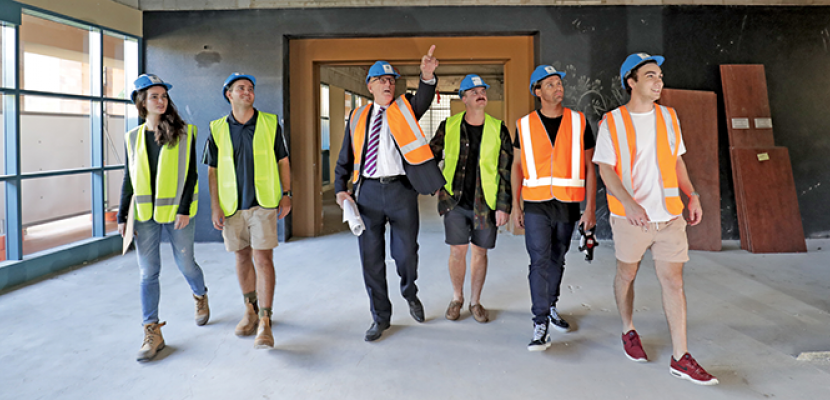
Ask anyone who works in construction, and they’ll tell you the world is urbanising at a rate that’s practically meteoric. As we grapple with where to put a population that can’t – and won’t – contain itself, we see buildings springing up at every turn. Behind every one of these buildings is a dedicated team, likely overseen by a construction manager.
Construction management is a fast-paced, varied, and often hands-on career path, and with a qualification behind you, there’s any number of roles to be explored. So, what does studying construction management at Bond look like?
We spoke to Professor Alan Patching (Associate Dean, External Engagement – Faculty of Society & Design) to get the drilldown on construction management programs here at Bond, as well as the professional outcomes available to graduates. Professor Patching has decades of experience in construction management, quantity surveying and project management, and has been teaching the next generation of construction professionals for almost 20 years.
Here's what you need to know about construction management according to a celebrated industry leader.
What does construction management entail as a career path?
“Construction management is exactly what the name suggests, which is managing the construction process,” Professor Patching says. Simply put, it’s a path of study that prepares graduates to tackle any number of challenges within the construction industry, from the initial development phases of building all the way through to completion.
Construction management careers are varied and diverse in line with how quickly this sector is growing. “When you look at the complexities of the modern construction process for modern buildings, and what we cover in an educational program, it’s multifaceted. It’s everything from determining whether a building is suitable for approval – people who do our courses actually go and work for approving authorities – to costing projects, scheduling projects and learning the technology,” Professor Patching says.
What makes somebody a good fit for a career in construction management?
According to Professor Patching, the number one skill that makes someone suitable for a successful career in construction management – or similarly, any related job, including quantity surveying, city planning, project management and property development – is passion.
“You’ve got to understand whether you love it or not,” Professor Patching says. “We recently had a student come to us wanting to change courses, because they had worked out that [onsite construction management] can be dirty, it can be noisy, and that didn’t really suit them. But, they still wanted to be associated with the industry. I think that’s the key thing – being aware of the parts of the construction sector that you’re passionate about and that you really love.”
“Big construction projects last for six or seven years from start to end, so you’ve got to have that involvement, that complete passion for contributing to the community, for building things, for making things – like an ‘engineering-putting-things-together’ mindset,” Professor Patching says.
Oops, something went wrong.
What does studying construction management at Bond entail?
Bond offers a wide range of programs that’ll give you the opportunity to dig deeper – pun certainly intended – into the world of built environment. These include both bachelor’s and master’s degrees in construction practice, quantity surveying, building information modelling and integrated project delivery (BIM IPD), valuation and property development, city planning and project management.
There are programs on offer to students both from Australia and internationally, with a range of tailored degrees for international students wishing to stay in Australia and work after graduation.
“We have undergraduate and postgraduate construction management programs, and the postgraduate ones for international students are the way they are because of our three-semester-per-year system,” Professor Patching says.
“So, at Bond for our Master of Construction Practice (Professional) program, we have added a professional development subject called Professional Portfolio, which is 20 weeks, to bring it up to the minimum standard required to equip students to work in Australia after.” This professional subject not only aids employability in the Australian construction industry, but it also gives students the tools they need to find and apply for the right jobs, communicate effectively and learn more about the Australian construction context.
Depending on their program, students at all levels will have access to hands-on experience, innovative learning techniques and the expertise of skilled academics and industry professionals, ultimately building a strong foundation for their future careers.
“Our master’s degrees are also ‘transitional’ courses, so you could have done an undergraduate degree in anything and still come and do this construction program,” Professor Patching notes. Students can enter many of the master’s degrees currently on offer at Bond with little to no assumed knowledge of construction practices or the industry itself, meaning that it’s never too late to kickstart a new career, whether your background is in architecture or arts.

What does the future of construction management look like?
The world is rapidly urbanising to keep up with population growth, so it’s safe to say that the construction industry isn’t slowing down any time soon. Professor Patching highlights that this is particularly true on the Gold Coast and South East Queensland regions, where growth is noticeably accelerating, with a number of huge corporate and residential projects currently underway – and only more to come.
“Brisbane’s successful Olympic games bid for 2032 together with the infrastructure happening here on the Gold Coast and throughout South East Queensland is creating a huge amount of work. It’s a great time to get in, because the next decade is going to produce incredible opportunities for employment,” Professor Patching says.
It’s the industry that keeps on growing, and with that comes a number of opportunities to earn at a high level, as well as become a specialist and learn niche skills within your area of interest. Construction and its surrounding careers are evolving, so people with cross-disciplinary skills are not just welcomed, but essential to stay on top of the changing landscape.
Professor Patching offers one last piece of advice to students considering study and a career in construction management.
“There is demand out there in the industry, but if you’re going to meet that demand, it’s not just about getting high marks,” he says. “It’s about having the passion to get in there, and the initiative to contribute and show that you love what you do.”